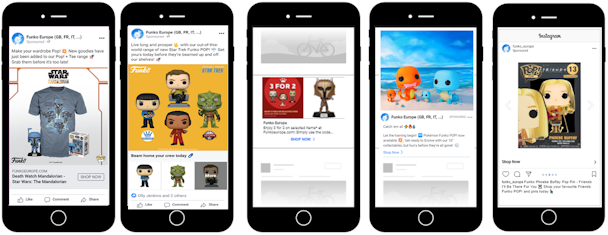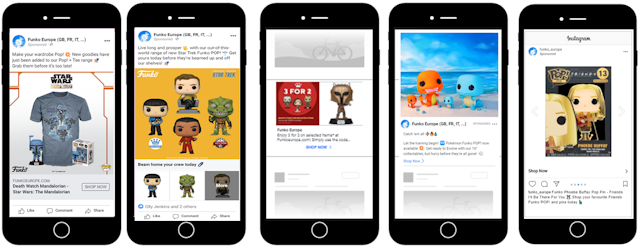How Funko adapted for the retail habits of fans
In December 2020, against the backdrop of a pandemic, Space & Time was appointed as the media partner of record for Funko.

Funko is an American company with a HQ in the UK and a large presence across EMEA, that creates and sells unique pop culture collectibles, fashion accessories, games and more, providing consumers with a tangible way to take their fandom offline. The appointment coincided with the launch of Funko’s first UK and European direct-to-consumer (D2C) site in this market: www.FunkoEurope.com.
Today, Space & Time leads Funko’s D2C media activity, including search marketing, D2C-focused paid social advertising, and programmatic advertising, as the brand continues to expand its presence in Europe, which represents a key growth market and priority for the business.

The Space & Time Funko team given the Pop! treatment.
Prior to the pandemic, Funko was a brand that predominantly sold offline through retailers and online through third-party suppliers. When the pandemic hit, the brand, like many others all around the world, needed to find alternative routes to market. With lockdowns disrupting traditional retail, Funko pivoted towards e-commerce.
As media partner, our core goals were as follows:
-
Help Funko grow [NET] new website customers
-
Establish sales in three European markets (UK, Germany, Spain)
-
Achieve a positive ROAS delivering a multiple return
We knew that getting our strategy right would be crucial, and that to do so we would need to adopt a fully informed and data-led approach, both with regard to targeting the consumer and pinpointing accurate attribution.
Equally, we knew that paid media would initially provide the bulk of Funko's site traffic, with an underlying need to establish organic traffic as quickly as possible. With thousands of SKU's appealing to hundreds of different fans, our approach would initially focus on the UK market, followed by Germany and Spain, with further European expansion thereafter. One key consideration here, and for any brand embarking on D2C was establishing the reason to buy direct.
As highlighted, Funko’s retailers were already selling a number of their SKU’s online, many with their own USP, be it free delivery, lowest price, range of other brands etc. Like most brands, the focus prior to embarking on its own ecommerce site was defining why to buy the brand direct.
This consideration was compounded by the brand’s additional lines of distribution; not just from the perspective of defining a compelling proposition to the shopper, but because of assessing the risk of competition with retailers who stocked its products. Continuing to nurture retailer relationships was important, as was being cognizant of the risk of competing with them for the same shopper. Subsequently we’ve been really strategic around everyone bidding on the same keywords, ultimately driving up the CPA and diluting Funko’s ROI as well as their volume with third parties.
Repeat retail
Our tactics have centered around leveraging Funko's direct buy USP of exclusive limited SKUs to convert shoppers with a greater propensity towards repeat purchase, and higher value weight of purchase, resonating with the collectibles consumer where provenance adds to their brand experience. On top of a substantial amount of pre-work such as collaborative commercial modelling (on traffic, conversion rates and sales), audience research and segmentation, and SEO throughout build and post launch, sustainable commercial success has been a continual consideration.
This has been achieved through a tactical plan focussing on channels and campaigns that would drive the highest ROAS first, and then scaling up vertically (by increasing budgets) and horizontally (by diversifying channels/campaigns).
Any D2C project is a big and costly commitment for a brand, so longevity has to be a factor, and our initial spend was modest to ensure utilising Google Search and Shopping formats, as well as Paid Social aimed at lower-funnel conversion.

Social budgets have grown substantially funded by defining a sustainably profitable model
Ultimately patience has paid off for both parties. Funko has enjoyed strong commercial success since launch, with their ROAS target being returned at 140%, and sustainable long term growth that’s paid for itself, funding campaign expansion into additional European markets.
Similarly from an agency perspective we’ve seen spend increase significantly, with our social budgets increasing ten-fold to drive new customer acquisition.
A D2C model isn’t a short-term option if it’s to be profitable, but if done well, there’s no reason why short-term profitability can’t be achieved in order to fund long-term growth, without coming at the expense of negatively impacting existing routes to basket.
Andy Griffiths, associate director, client growth at Space & Time.
Content by The Drum Network member:

Space & Time
Space & Time is a growth marketing agency, enabling clients to secure optimal value from every part of the customer experience and their marketing investment....
Find out more
